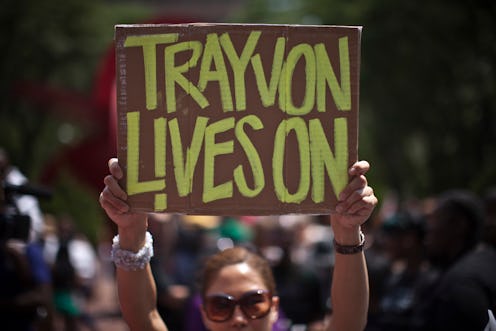News
Thousands at "Justice for Trayvon" Protests
Thousands rallied in over 100 U.S. cities Saturday to protest George Zimmerman's acquittal, a week after he was cleared of all charges relating to the fatal shooting of unarmed black teenager Trayvon Martin.
At least 2, 000 protesters gathered in New York, calling for an end to racial profiling and demanding that Zimmerman face federal charges. Among those in attendance were Sybrina Fulton, Martin's mother, as well as Jay-Z and Beyonce.
Fulton told the crowd at one point: "Today it was my son. Tomorrow it might be yours."
"Trayvon was a child," she added. "I think sometimes it gets lost in the shuffle because as I sat in the courtroom, it made me think they were talking about another man. And it wasn't. It was a child."
Many of the protests were led by the National Action Network, headed by civil rights activist the Reverend Al Sharpton, who said earlier in the week that he saw Trayvon's death as a signal that the civil rights movement should be revived.
"We are not coming out with violence, we are coming to denounce violence. The violence that was perpetrated on an unarmed, innocent man named Trayvon Martin," Mr. Sharpton said to the gathered protesters.
A group of nearly a thousand people also marched peacefully across the Brooklyn Bridge, making a short stop outside the federal courthouse in Brooklyn.
Another 2,000 people attended a Trayvon Martin Prayer Vigil and Rally in downtown Atlanta, standing in the pouring rain to chant, "Trayvon, Trayvon, Trayvon." Speakers, including Martin Luther King III, then addressed the crowd, urging change and telling them to seek repeal of Georgia's "stand your ground" law.
Smaller rallies of around 500 people also took place in L.A. and Chicago, and another group of over 100 protested in Oakland.
Hundreds also demonstrated in Miami, and Trayvon Martin's father, Tracy Martin, was one of the protesters who gathered to sing the civil rights song "We Shall Overcome".
On Friday, President Obama broke his silence on the subject, saying gravely that "Trayvon Martin could have been me 35 years ago," and urging Americans to remember that "the African-American community is looking at this issue through a set of experiences and a history that doesn’t go away."
